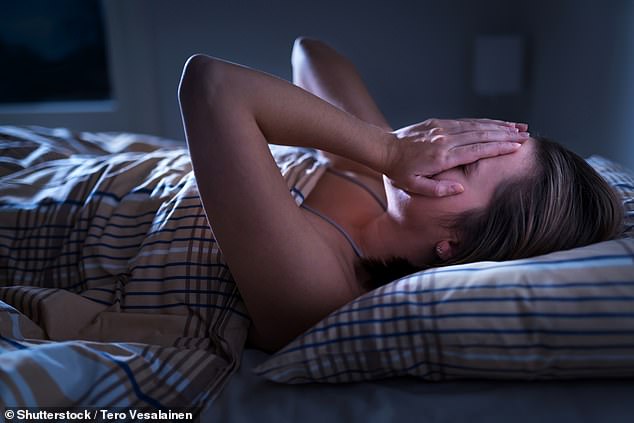If you haven’t slept well, the last thing you want to do is go to the gym.
But exercising twice a week or more significantly reduces the risk of insomnia, according to a study.
People who exercise regularly are 42 percent less likely to have difficulty falling asleep than those who are inactive, and are 22 percent less likely to report any symptoms of insomnia, research suggests.
The study, published in the journal BMJ Open, also found that people who continued to exercise long-term were significantly more likely to sleep normally (six to nine hours of sleep per night) compared to those who did not exercise.
They were also significantly less likely to be short sleepers (six hours a night or less) and 52 percent less likely to be long sleepers (more than nine hours a night).

People who exercise regularly are 42 percent less likely to have difficulty falling asleep than those who are inactive, and are 22 percent less likely to report any symptoms of insomnia, research suggests (file image )
Even people who had not previously exercised, but then started exercising during the study period, were 21 percent more likely to sleep normally than those who remained persistently inactive.
For the research, experts examined data from nine European countries involving 4,339 people, approximately half of whom were women.
Participants in the study were asked questions about their exercise levels at the beginning and then asked again a decade later.
They were also asked about insomnia symptoms, such as how often they had trouble falling asleep, staying asleep, or waking up too early, and how long they slept on average.
People who exercised two or more times a week, for at least one hour per week, were classified as physically active.
If they were still exercising at this level a decade later, they were classified as persistently active, which was a quarter of people.
Meanwhile, 37 percent of people remained persistently inactive, 18 percent became active, and 20 percent became inactive.
Analysis of the data showed that “physically active people have a lower risk of some symptoms of insomnia and extreme sleep durations, both long and short.”
However, researchers, including those from Imperial College London and Reykjavik University in Iceland, warned that the benefits could be lost if people stopped exercising.
Huw Edwards, chief executive of ukactive, the UK trade body for the physical activity sector, said: “Physical activity plays a huge role in our physical and mental health, with benefits such as better sleep, reduced stress and anxiety, and better productivity, social connection and well-being.
‘This study shows the essential role that physical activity can play in reducing the risk of insomnia and we know that getting a good night’s sleep helps us feel better and be more productive the next day.
‘Our own research shows that one of the main motivations for exercising in the UK today is to help people sleep better, so it’s essential that everyone feels supported to engage in physical activity in their daily lives.
Your browser does not support iframes.
“We want to make the UK the most active nation in Europe, which would save up to £1bn a year in healthcare costs linked to physical inactivity, and an extra £3.6bn in GDP from increased productivity.” “.
The new study found that the people who exercised the most were likely to be men, younger, and weigh slightly less.
They were also less likely to be current smokers and more likely to be currently working.

